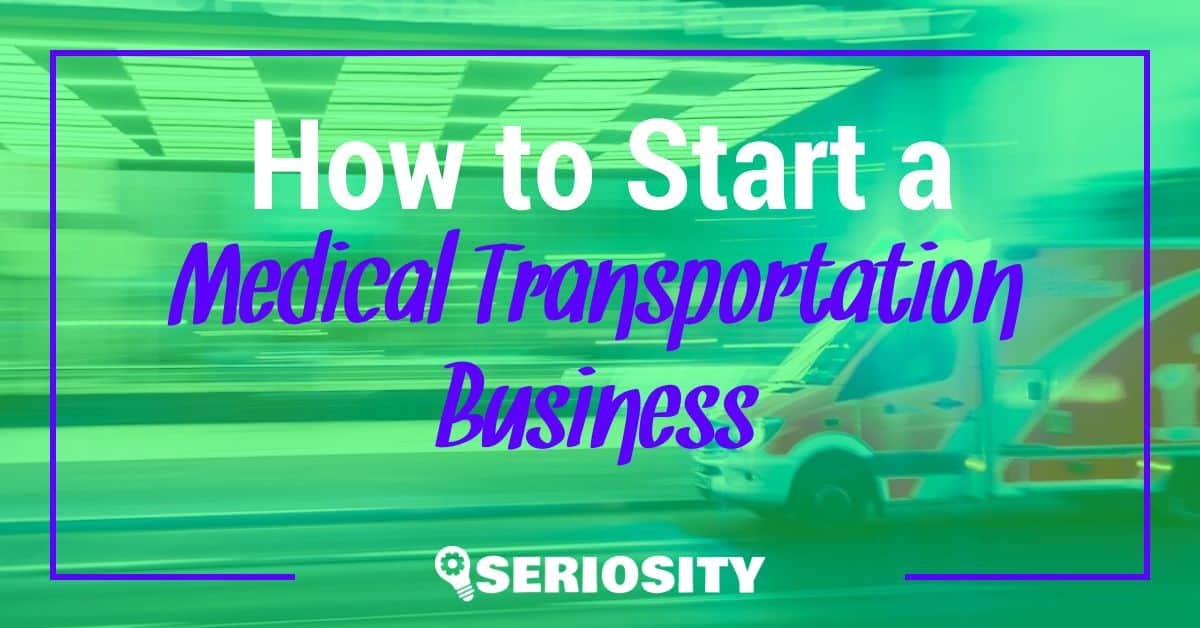A medical transportation business provides transportation for individuals who need these special services, such as those with disabilities, seniors, and those with medical conditions requiring special transportation.
Medical transportation businesses use specialized vehicles outfitted with medical equipment and personnel. Services may include wheelchair transport, stretcher transport, non-emergency medical transportation, and other specialized transportation services.
Here is a list of the seven steps to take to start a medical transportation business:
- Research the Market: Before you start a medical transportation business, it’s important to understand the market. Research your local area to see what services are available and prove there is a need for a new medical transportation business.
- Plan Your Business: Once you understand the market and need for your medical transportation business, you can begin planning your business. This will include making a budget, choosing a business structure, creating a business plan, and raising capital.
- Get the Necessary Licenses, Permits, and Insurance: Depending on your location, you may need certain licenses, permits, and insurance to operate a medical transportation business. Check with your local and state governments to determine what is required.
- Purchase or Lease Equipment: Once you have the permits and licenses, you can purchase the necessary equipment for your business. This will include vehicles, medical equipment, and safety equipment.
- Hire Employees: You may need to hire drivers, medical professionals, and other staff to help you run your business. Make sure to thoroughly vet potential employees with a background check and drug testing and ensure that they meet your standards for safety and professionalism.
- Market Your Business: Once you have everything in place, it’s time to market your business. You can reach potential customers through traditional and digital marketing strategies.
- Monitor Your Business: Lastly, you must monitor your business to ensure it is running smoothly. This includes staying current on industry trends, monitoring customer feedback, and making necessary changes.
Cost of Starting a Medical Transportation Business
The cost of starting a medical transportation business will vary depending on the size and scope of your business and the type of services you offer. Generally, you’ll need to factor in the cost of obtaining the necessary licenses and certifications, purchasing a vehicle, leasing equipment, and getting the required insurance.
Additionally, you need to factor in the cost of hiring staff, office and garage facilities rent, marketing, startup costs for legal and any other business expenses. You can easily invest up to $100,000 to get a medical transport van and get started. You may have to work very much during your first few years of operations to become established.
Budgeting for Cash Flow Problems
Almost all startup businesses have cash flow problems. A medical transportation company is no exception. You will likely suffer from cash flow problems if you don’t manage the business carefully.
You must be extremely careful about the time necessary to receive payment for your services. The first reason a company goes out of business is a cash flow problem. A company may have booked many accounts receivable, but collections may come in too slowly to keep the operations running smoothly.
Whatever you think you may need, try the strategy of doubling that amount and adding 10% more for emergencies. For the basic startup example given above, with one vehicle and using the estimate of needing $100,000, you should make the capital raise $220,000 to avoid financial problems caused by any unforeseen short-term cash flow problems.
Competitive Analysis
Before you risk your investment in a startup medical transportation business, you want to conduct a thorough market survey and competitive analysis.
One technique you may use is pretending to be a potential customer. Make contact with the companies in your area that are currently providing medical transportation services. Find out as much about them as possible by calling them and researching any information about them online.
If you find only a few competitors, be careful because, rather than being an excellent opportunity, this may indicate that there is not enough business in the area to justify starting a medical transportation business.
If you find a lot of competition, don’t despair. First, look at the value proposition they offer in terms of price and quality of service. The presence of many competitors may indicate a thriving and vibrant marketplace as long as you can distinguish yourself and your new company as a better choice when compared to the competition.
Marketing
A successful medical transportation business requires an effective marketing strategy. This can include creating a website and using social media to promote your business, attending networking events, and building relationships with local hospitals, medical offices, and other healthcare professionals.
You may consider partnering with other healthcare companies to increase your reach and visibility. Additionally, you can contact insurance companies to see if they will cover your services.
FAQ
1. What kind of licenses and other requirements are needed by the company and the staff of a medical transportation business?
The company and the staff must be licensed and certified by the state where they operate.
Company Licensing and Certification Requirements
The company must have a regular business license and a special certificate to offer medical transport services.
Staff Licensing and Certification Requirements
Vehicle drivers must have a commercial driver’s license and be certified for medical transportation services.
In some states, the staff may be required to have additional certifications such as CPR, first aid, and an emergency medical technician (EMT) certification.
2. What types of insurance are needed for a medical transportation business?
Medical transportation businesses need to secure liability insurance, workers’ compensation insurance, and any other types of insurance that may be required by their state or local government.
The company must have commercial vehicle insurance and maintain adequate commercial vehicle insurance coverage to protect staff and clients in the case of a traffic accident. Additionally, the vehicles must be inspected and certified as safe for medical transportation.
3. Is a medical transportation business the same as a med-evac unit?
No. A medical transportation business provides non-emergency medical transportation services, while a med-evac unit provides emergency medical transportation services. Med-evac units are used by first responders in emergencies and are typically operated by a hospital or other healthcare facility.
4. What types of vehicles are used for a medical transportation business?
The type of vehicle used for medical transportation will depend on the style of medical transportation services provided. Wheelchair-accessible vans and buses are typically used for wheelchair transport, while ambulances are used for stretcher transport.
For non-emergency medical transportation, various vehicles, such as a sedan, minivans, SUVs, or buses, can be used. Costs will vary depending on the type of vehicle used, but a new wheelchair-accessible van can cost up to $60,000, while a new ambulance can cost up to $250,000.
5. What type of training is necessary for a medical transportation business?
Depending on the services you offer, you may need to obtain special training or certifications to operate a medical transportation business.
For example, if you’re offering non-emergency medical transportation services, you may need to obtain a certification in Emergency Medical Technician (EMT) or related training.
Additionally, you may need to obtain special certifications to transport medical patients in specialized vehicles, such as ambulances or medical vans.
6. How much can a company charge for providing medical transportation services?
The cost of medical transportation services will vary depending on the service type and location. Generally, companies charge an hourly rate for their services, typically ranging from $35 to $250 per hour.
Rates may also be based on the type of vehicle used, the distance traveled, and any additional services provided, such as wait time or special equipment like oxygen.
7. How much money will I make as a business owner?
iSi Technology offers software to efficiently operate a non-emergency medical transportation (NEMT) business. They report that the average revenues for a NEMT company are $40,000 to $60,000 annually per vehicle in operation.
The median in America for a successful NEMT company is $2.5 million in annual revenues. The well-positioned companies operate a fleet of up to 50 vehicles in a major metropolitan area. Efficient management may produce a gross margin on costs of 80% of this figure.
Your revenue will depend on the rates you charge for your services, the efficiency of your operations, the price of fuel, and your ability to market your business effectively.
Ultimately, the amount of money you make as a medical transportation business owner will depend on how well you manage your business.
Sources
How Much do NEMT Companies Make?





